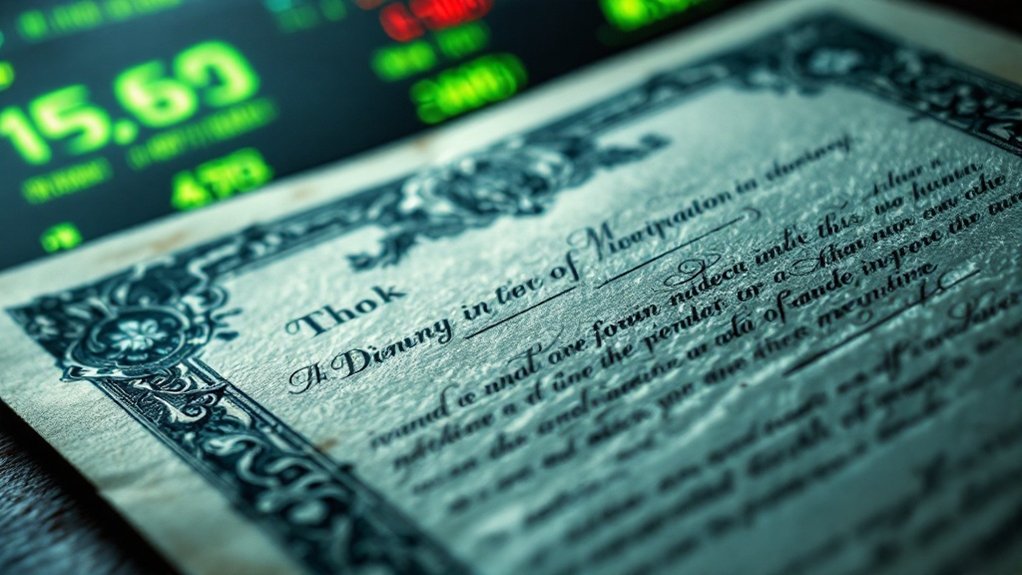A stock is a slice of ownership in a company, plain and simple. When someone buys stock, they become a part-owner in that business, sharing in both profits and losses. These ownership pieces trade on stock exchanges, where prices bounce up and down based on company performance and market mood swings. Investors can make money two ways: selling shares for more than they paid or collecting dividend payments. The deeper story of stocks reveals an fascinating world of financial possibilities.

Money makes the world go round, and stocks are one of the primary ways people build wealth in modern markets. At its core, a stock represents a slice of ownership in a corporation – like getting a piece of the company pie, complete with all the potential rewards and risks that come with it. When you own stock, you’re literally a part-owner of that business, whether it’s 200 shares or 2 million. Capital gains and regular dividends provide shareholders with two distinct ways to profit from their investments.
Companies love selling stocks because it’s a fantastic way to raise cash without going into debt. Need a billion dollars for expansion? Sure, just sell some shares. The beauty of it is that investors can make money in two ways: through stock price increases (capital gains) or by receiving regular dividend payments. It’s like having your cake and eating it too – assuming the company actually succeeds. Stocks are primarily traded through organized stock exchanges, where buyers and sellers come together to conduct their transactions.
Stock markets let companies raise mountains of cash while giving investors two sweet paths to profit: rising share prices and regular dividend checks.
Not all stocks are created equal, though. Common stock lets you vote on company matters, while preferred stock typically offers fixed dividends but no voting rights. Think of common stock as being a rowdy participant at the corporate party, while preferred stockholders are the quiet ones who just want their guaranteed piece of the profit pie. Strategic investment choices can significantly impact potential returns.
The stock market is basically a massive auction house where these ownership pieces trade hands constantly. Prices bounce around based on everything from company performance to whether someone important sneezed at the wrong time. It’s a complex dance of supply and demand, with everyone from small investors to massive institutions trying to get their groove on.
Smart investors know that stocks come with both opportunity and risk. That’s why many spread their bets across different types of stocks – growth stocks for potential rocket-ship returns, value stocks for bargain hunting, and blue-chip stocks for those who prefer their investments boring but reliable.
Some even let the company buy back its own shares through treasury stock, which can help prop up the stock price. It’s all part of the grand financial circus, and everyone’s trying to get the best seat in the house.
Frequently Asked Questions
How Do I Protect Myself From Stock Market Scams and Fraud?
Investors should conduct thorough research, verify credentials of financial professionals, avoid unsolicited offers, resist high-pressure sales tactics, and report suspicious activities to regulatory authorities like the SEC.
What Time Do Stock Markets Open and Close in Different Countries?
Major stock markets operate on different schedules: US markets trade 9:30AM-4PM ET, London 8AM-4:30PM GMT, Tokyo 9AM-3PM JST with lunch break, and Australia 10AM-4PM local time.
Can I Buy Stocks Without a Broker or Trading Platform?
Investors can purchase stocks directly through company-sponsored Direct Stock Purchase Plans (DSPPs) and Dividend Reinvestment Plans (DRIPs), bypassing traditional brokers while often benefiting from lower fees and automated investing.
Which Stocks Are Considered the Safest for Long-Term Investment?
Well-established companies like Microsoft, Johnson & Johnson, and Procter & Gamble are considered safest due to consistent dividends, strong market positions, stable cash flows, and proven track records.
How Do Stock Splits Affect My Investment and Share Value?
Stock splits increase share quantity while proportionally decreasing price, maintaining total investment value. While the number of shares changes, the overall portfolio value remains the same.





